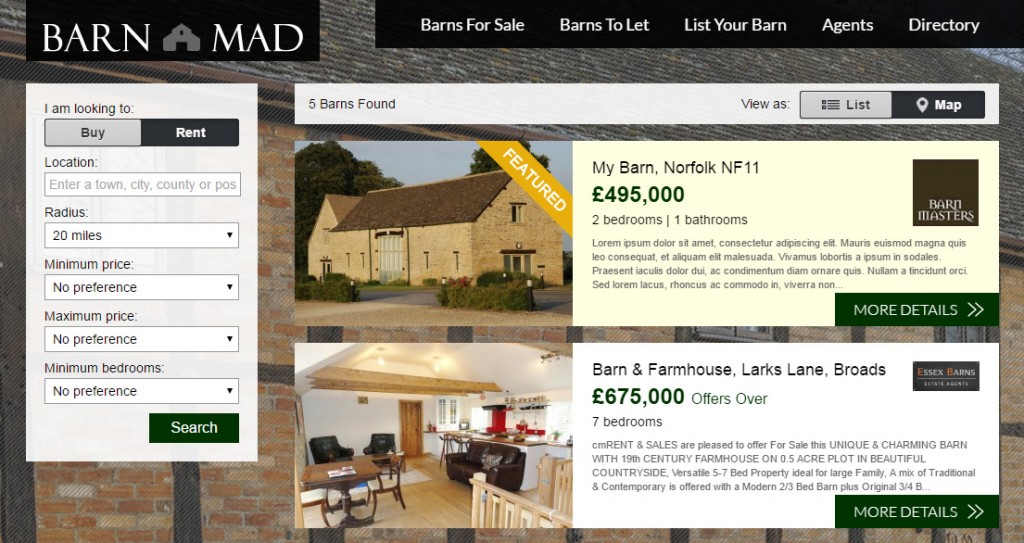Let me start by making something very clear; Starting a property portal is hard work, REALLY hard work. “I want to become a competitor to Rightmove” is something I’ve heard a lot in my long career in the property software industry, and when I hear it said these days I can’t help but give a little chuckle. There is definitely nothing wrong with having dreams, being an entrepreneur and having an ambitious streak, but let’s be serious for a moment.
Firstly, this article is not by any means meant to discourage anyone wanting to create a property portal. They can be fun to do, you’ll definitely learn a lot in the process, and you might even turn it into a full-time career. I’m not here to tell you what ambitions you can and can’t have so if you want to do a portal, go ahead and follow your heart. This article is purely informative, is meant to assist with your decisions, and hopefully make you think about some things that you might not have considered previously.
My Own Experience
Why do I think I know so much about this? It’s because I’ve been there. I’ve had that big idea, I’ve put it into practice, and unashamedly, I failed.
3 years ago I started a property portal called Barn Mad. This was a niche site aimed at people wanting to sell and buy barn conversions. There wasn’t much competition around, I knew how to code and had servers already so development costs would be zero (except my own spare time), and I figured being niche it would be easier to rank in search engines.
The reason it failed is because I hadn’t carefully considered some of the points that follow further down. I’ve also seen, and been involved with, a lot of property portals sites that have been and gone for the same reasons.
So let’s get started by looking at, in no particular order, some of the key areas involved:

Planning
Start here. Document everything and don’t do anything until you know exactly what you’re going to do and how you’re going to achieve it. The planning phase should not only consist of a business plan outlining business principles and monetary information, but also a full development plan on how exactly the site is going to function. A few of the things to include in the plan might be:
– Your aims, both short and long term
– Your USP (Unique Selling Point)
– Competitor analysis
– How you will monetize the site
– Who else will be involved in the project and what is each person’s responsibilities
– Your projected forecasts for profit and loss
– How you are going to get properties onto the site
– What functionality is required to get version 1 of the site out of the door
– Your exit plan should the business suceed or fail
The plan should be fairly large once it’s finished. Although you might think you’re just writing down stuff you already know in your head, sometimes writing things down makes you think about things in more detail, and is also great for other people involved if you are doing this venture with others to ensure you’re all on the same wavelength.

Get a Good Developer
Unless you know how to code already and have a deep understanding of a particular language, it goes without saying you’re going to need a web developer. It’s absolutely paramount in my view that you use a developer that has the following characteristics:
– Has a deep understanding of the language that the site will be written in.
– Ideally has experience with property websites and, if you’re going to be importing properties from third parties, understands how automated feeds from third parties work. Feeds are confusing things with so many caveats. The alternative is to use the Property Hive Portal Add On which makes supporting feeds super simple and takes away all the hassle.
– Has at least some experience at the server-level. Again, referring to the automated feeds, these things are not only confusing at first but will require sort of work be done on the server itself (changing settings, setting up FTP directories, maintaining and debugging feeds).
– Is easy to work with. This isn’t going to be a five minute job. It will take weeks, if not months, so you need to establish a long term relationship with this person.
– Writes clean and well documented code. Unless you’re planning on the one developer for the rest of eternity, you want someone that is able to write pristine code. Yes, the public doesn’t see the code, but this will save you massive headaches in the future if and when other developers come onboard.
A developer is going to be one of your highest costs at the start, but also the most important. If you’re serious about this venture don’t scrimp on this step.

Money
As I mentioned above, it is technically possible to create a property portal with zero cost to start with if you’re already an experienced developer in which case it’s only your time that it’s costing you. Otherwise, the first cost, and one of the biggest, will be for a developer. The cost for a developer will vary massively depending on the complexity of your site and the skills of the developer. Using Property Hive and the Property Portal Add On will help reduce the time taken to develop the site and therefore hopefully the cost.
Following that, it’s really a case of how much money you have available and how much you have allocated to the various tasks; Marketing, SEO, advertising, website hosting and support are just a few. Another cost that people often don’t know about until the time comes is that, if you’re looking to support automated property feeds from third parties, some software providers charge for this.
If you’re looking to compete with Rightmove and Zoopla (see the ‘Be Niche’ section below) you will need millions. Millions and millions and millions. If you don’t have that available then there’s no harm in starting small. Invest what you can afford and build it up gradually. Rome wasn’t built in a day!
Infrastructure
A single site hosting package for a few pounds per year isn’t going to cut it I’m afraid. You will need your own server as I’m assuming you’re looking to display thousands and thousands of properties. Property portals are big sites, and when you throw automated property feeds into the mix, they balloon.
As with the money point above, it’s OK to start small. We use a company called Digital Ocean for our hosting. They’re fab, start at just $5 per month, and, being cloud based, allow you to upgrade to the next sized package at the click of a button when required.
The other thing to consider regarding infrastructure is that maybe one server might not be enough. You might have one server for the main public site, another to process the automated feeds, and another to store media. Again, this can all come in time but it’s worth thinking about now. This also reiterates why having a good developer is key as a good one will be able to assist with this when the time comes.
The last thing to think about regarding infrastructure is which platform your site will be built on. You could build a completely bespoke application from scratch, use a code framework such as PHP’s Laravel, or use a CMS like WordPress. Don’t let people tell you that WordPress can’t be used on big sites. It absolutely can. In fact, some of the worlds most popular sites are built using WordPress; TechCrunch and The New Yorker to name just a few.
Be Niche
As mentioned above, it’s going to very difficult to compete with the big players unless you have some serious financial and personnel backing. Why not try being a little different and focussing on one area of the property market. You might already be dead set on a particular niche, however some ideas might be:
– Focus on a particular property type (barn conversions, cottages, caravans, land etc)
– Only deal with properties for auction
– Only deal with student properties
– Focus on a particular town or region
The competitor analysis part of your original planning will really assist with this part and allow you to see where it’s going to be easiest to excel, and where you might be fighting a losing battle.

SEO and Marketing
Good SEO and marketing is likely going to be a deciding factor on whether your site makes it or not. It takes a lot of time and you need experience in this to do it effectively. As with the developer, if you don’t know much about SEO and marketing then I recommend getting someone else in to do this for you if you have the funds available.
Choosing to build a niche site will allow you to rank higher for certain keywords, however the downside is that you’re likely to receive less traffic than if you were more generic as less estate agents may deal with properties in that niche, and less people are looking to buy and rent them.

Don’t expect results overnight
The development and growth of the site will take time and you probably won’t see many results until at least a few months into the project, if not years. If you’re passionate about your venture then stick with it and, if you do things well enough, the results will come. Even one extra visitor a day to your site is an achievement so keep an eye on them analytics, keep on pushing, and remain positive.

Have a plan for if it goes wrong
Imagine you have thousands of properties on your site from hundreds of estate agents. They display your logo in their shop windows, they link to you on their sites proudly claiming “We list our properties on X site”, then 6 months down the line you can’t maintain the site so shut it down. You’re representing all of these agents and are responsible for accurately listing thousands of vendors and landlords properties. You need an exit plan for if things don’t go as hoped.
This should be part of the original plan (See ‘Planning’ above) so you should already know the answer to this. I don’t have a definitive answer on how best to handle this. My only advice would be communication, communication, and more communication. Don’t remove the site off the face of the planet when you feel like it. Announce to the agents your plans, your reasoning and provide a date for when the site will be taken offline. This allows them time to remove any mentions of your site.
Conclusion
I could write about this topic for days given the chance. If you’ve come here with plans to create a property portal then I hope this has proven to be useful for you. Don’t forget that you can create a property portal website in WordPress using Property Hive and our Portal Add On so please get in touch if you have any questions about taking this route.
I’d love to hear your thoughts on the above. Maybe you operate a portal now, you’ve done so in the past, or you’re thinking of building one soon.




